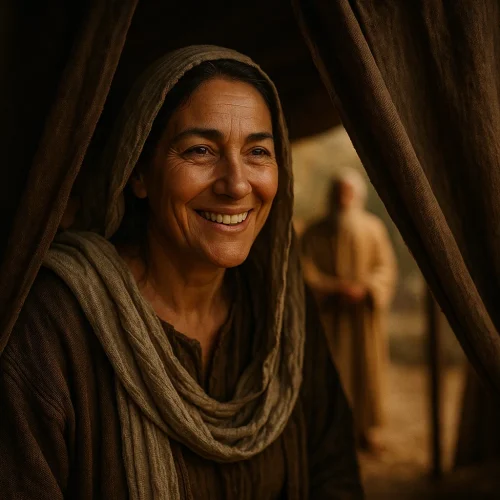God had promised Abraham countless descendants like the stars of the heavens and the sand of the sea, yet he had only one son—Isaac—who was still unmarried at thirty-seven!
This week’s parashah speaks about the life of Sarah, and at the same time teaches us how the patriarch Abraham managed to endure trauma and pain in the final stage of his life.
Abraham was an old man and had already gone through two deeply painful experiences involving the people he loved most. The first was related to his son Isaac, whom he had waited for all his life. He and Sarah had lost hope, yet God promised they would have a son and that he would carry on the covenant. The years went by and Sarah did not conceive. She grew old, but the promise remained. At last, Isaac was born. There was joy. Sarah said, “God has made me laugh, and everyone who hears of it will laugh with me” (Gen. 21:6).

Then came the unthinkable: God said to Abraham, “Take now your son, your only son Isaac, whom you love… and offer him as a burnt offering” (Gen. 22:2). Abraham did not argue or delay. Father and son traveled together, and at the final moment, a voice from heaven said, “Stop!” How does a father and son survive a trauma like this?
Then came a different kind of pain: Sarah died. She was his beloved wife, his companion on the journey, the one who left everything with him—land, home, and family. Twice she even risked her life by saying she was his sister to protect him.
So what does an old man like Abraham (the Torah calls him “old and advanced in years,” Gen. 24:1) do after all this? Surely his heart was heavy. He had obeyed Yehovah, yet many promises were still unfulfilled. God had promised him the land of Canaan, but when Sarah died, he didn’t own a single piece of it—not even enough to bury her. God had promised him countless descendants like the stars of the heavens and the sand of the sea, yet he had only one son—Isaac—who was still unmarried at thirty-seven. Humanly speaking, Abraham had every reason to be discouraged.
And yet, he did not remain paralyzed. The Torah says, “Abraham came to mourn for Sarah and to weep for her” (Gen. 23:2). Then immediately, we read: “Then Abraham rose up from before his dead…” After this, he focused on two things: buying land to bury Sarah and finding a wife for his son. These two actions were directly connected to God’s two promises: land and offspring. Abraham didn’t wait passively for God to act; he understood he needed to take responsibility.
How did Abraham overcome trauma and sorrow? How does someone move forward after nearly losing his only son and then losing his wife? What kept him going?
The Torah shows us two people who faced trauma in opposite ways: Noah and Lot’s wife. Noah, the most righteous man of his generation, obeyed Yehovah even as the rest of the world faced destruction, and through his obedience, he saved his life and his family. In contrast, Lot’s wife disobeyed the angels’ command and “looked back” as Sodom and Gomorrah were destroyed. She became a pillar of salt—paralyzed by shock and unable to move forward. These two stories help us understand Abraham’s response after Sarah’s death. He chose to build the future rather than remain trapped in the past—as Lot’s wife did.
Abraham kept the promise in sight. Sarah was gone. Isaac was unmarried. He had no land or grandchildren. But he did not accuse God or give in to despair. Instead, he remained sensitive to Yehovah’s call to move forward and trust. That is how Abraham survived grief and shock.
May Yehovah spare us from such trials—but if they come, let us follow Abraham’s example: focus on the promise.
We are not here by accident. We are here because God wanted us here, and because there is a task we must fulfill. Discovering it is not always easy—it can take years and even bring frustration. Yet each of us has something God is calling us to do, a purpose to accomplish.
Let us not allow the past to chain us down. Instead, let us learn to endure pain like Abraham did, and keep our eyes on the promises of Yehovah for our lives.
Shalom!